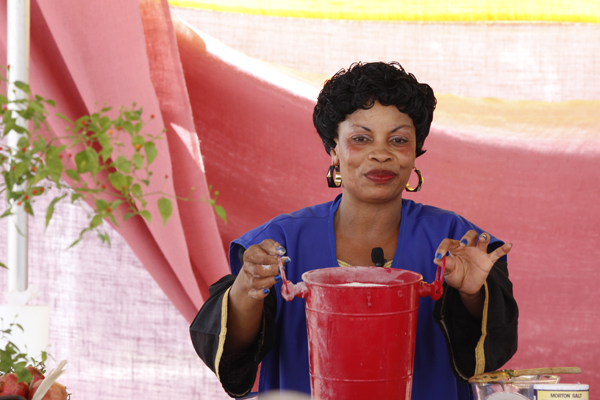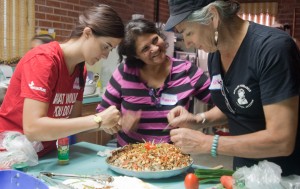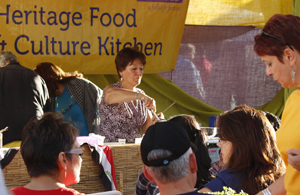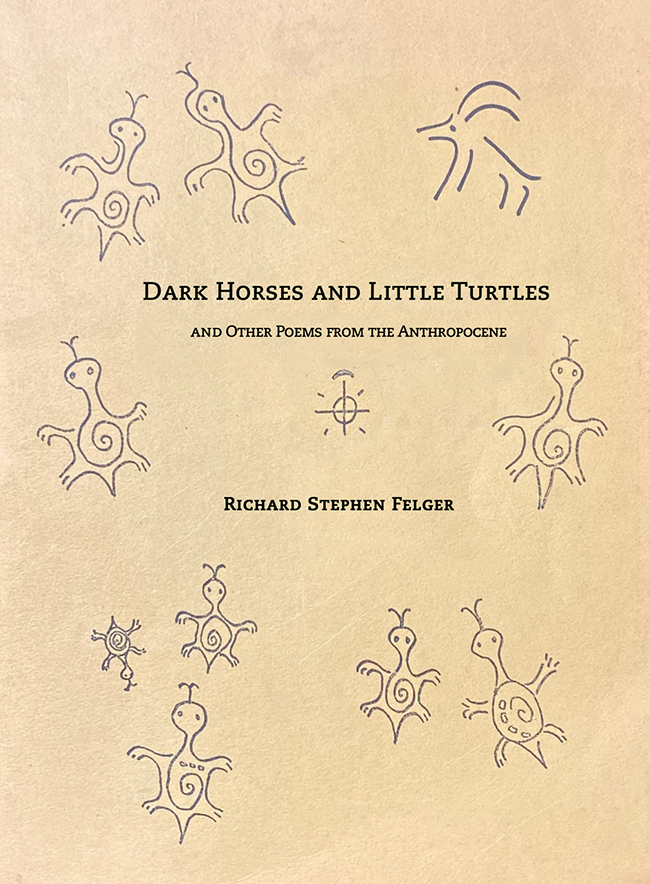Entrepreneurs in a Cultural Urban Kitchen
A common denominator fuels body, spirit and economy.

Marie Bampamluolwa demonstrates FuFu flour tin at Tucson Meet Yourself.
photo by Samantha Angiulo
There’s a lot to talk about around Tucson’s culinary table, with so many finding their passion in locally-nourished baked goods, suds, cheeses, spirits and condiments. Food is the universal facilitator these days. But when cooks, as Michael Pollan says, stand “squarely between nature and culture,” food sovereignty is ignited, adding the spice of tradition to Tucson’s kitchen, in surprising ways.
Dishes & Stories, a refugee and immigrant women’s culinary enterprise, has entered the conversation as a new social purpose organization focused on food culture and women’s self sufficiency. This is a joint venture between the Iskashitaa Refugee Network and Crossings Kitchen, the sole proprietorship of Priscilla Mendenhall, a Washington D.C. transplant, foodie and career non-profit professional who has transitioned to social enterprise.
In its start-up phase, Dishes & Stories is a catering service with a globally-inspired, locally-sourced menu prepared by the refugee and immigrant women who are co-creating the enterprise. “Featuring a menu of our mother’s recipes,” Mendenhall adds.
Culinary Connector
There’s synergy between Mendenhall’s Crossings Kitchen and Iskashitaa, established by Dr. Barbara Alice Eiswerth in 2003 as a sustainable foods harvesting and redistribution program and a language and employment skills support network for refugees transitioning to life in Tucson.
“With food as the common denominator, we’re helping refugees and immigrant women in a strange land use their skills and cultural practices to build community and livelihoods,” says Eiswerth, who founded her large-impact organization after visiting and working in Malawi and returning to see food waste in Tucson.
After organizing youth mapping programs to identify locations of produce going to waste in Tucson, Dr. Eiswerth received a grant from the United Way to begin regularly harvesting with refugees, then redistributing to refugee families and other Tucson organizations to assist families in need. Thus, Iskashitaa (the Somali Bantu word for “working cooperatively together”) was born.
Each year, approximately 1,000 new refugees of 20 nationalities make their way to Tucson, and Iskashitaa reaches hundreds to help them rebuild businesses, share stories, learn English and, importantly, harvest local fruits and vegetables from cooperating farms, backyards and neighborhoods, to be re-envisioned within healthy recipes that help refugees retain tradition and activate a sustainable place for themselves in the Tucson’s local food system. Iskashitaa produces a line of 30 specialty food products, including marmalades and salad dressings, featuring locally harvested produce.
What Dishes & Stories/Iskashitaa does is catalyze opportunities for education, employment and entrepreneurship, comments Mendenhall: “For us, ‘catalyze’ is the key word, Our roles as founders of Dishes & Stories are to leverage the financial, structural and logistical means of building a sustainable business which, within five years, will be a cooperatively managed and owned social enterprise.”
Activating the Enterprise
The start-up phase of the Dishes & Stories catering service already is serving up at local venues including the Tucson Museum of Art and during the annual Tucson Meet Yourself event. With its changing array of participants from Iraq, Syria, Egypt, Congo, Sudan, Bhutan, Somalia, Afghanistan, Ethiopia, Eritrea, Mexico and El Salvador, Dishes & Stories is a moveable feast, according to Mendenhall.

Brittany Svoboda (of the UA Enactus Club, left), Manerva Bashta and Kelzi Bartholomaei (of Mother Hubbard’s Cafe, right) preparing a platter of an Egyptian dish called koshari at the Dishes & Stories Cooking Retreat.
photo by Melissa Gant
The organization, utilizing rented while actively seeking a permanent commercial kitchen space, is beginning a basic culinary art training program while working out of the large Rincon United Church of Christ kitchen on Craycroft and Broadway. The Dishes menu is inspired by the traditional recipes of the refugee and immigrant women participating, and items range from tortilla sambusas (Somali wraps) and falafel to pumpkin stew, sautéed amaranth and chicken-mushroom curry. Mendenhall says that cheese pairings, desserts and marinades also feature seasonal Iskashitaa specialty food items.
Critical to the program is the storytelling component that surrounds all dishes featured on menu. “The stories of these dishes are told by the cooks and staff as they host and serve,” Mendenhall explains, “and the stories will also be incorporated into cooking classes and cultural celebrations. For many refugee and immigrant women, the utensils and cookbooks they bring from home help encapsulate their stories into their dishes, in ways that words cannot possibly convey.”
Dishes & Stories has a business plan which progressively expands catering, adds a food truck and ultimately opens a 40-seat restaurant, which will also be sales venue for Iskashitaa specialty food items.
“Knowing the challenges of any food service, and the complexities of providing programs tailored to women living on the edge, we are moving incrementally,” says Mendenhall, who notes that culturally-inclusive training in pre-employment (in cooperation with YWCA Tucson), business management, success coaching and financial literacy will be implemented as business operations continue to demonstrate success. All of these programs will be designed to accommodate the daily logistical and financial challenges experienced by women who face multiple barriers to creating their own self-sufficiency, says Mendenhall, who adds, “We have a formal framework in place for cooperative management and financial independence within five years.”
Healthy Communities, Supporting Local Systems
Through food preservation workshops, formal cooking retreats and the catering events, refugee women are sharing their cooking experiences and knowledge of traditional foodways as they envision theirs and Dishes’ future.
Mendenhall recounts a recent September night, when one refugee cook from Upper Egypt, Manerva Bashta, watched with both tears and smiles as hungry attendees to a Tucson Museum of Art event relished her dolmas (stuffed grape leaves) and burek (savory puff pastries).
“This was the first time Manerva had prepared food professionally, the food of her family and homeland,” Mendenhall says. “She came to the U.S. seeking asylum as she fled the persecution of Christians in her town. Here, she studies English, applies for jobs, shops carefully at Babylon and Caravan markets, takes care of her grandchildren and spends hours waiting for buses, especially on weekends. In Egypt, she taught business. Dishes & Stories provides a venue within which Manerva can renew confidence in her business and culinary skills.”

Faeza Hililian (center) and Dishes & Stories founder Priscilla Mendenhall (right) at Tucson Meet Yourself Culture Kitchen.
photo by Samantha Angiulo
Mendenhall also explains that as part of her involvement, Manerva will assist in routinely helping to calculate ingredient costs, the preparation time and price points for each dish.
Dishes & Stories recently received a grant from the Women’s Foundation of Southern Arizona to initiate a culinary and vocational English as a Second Language (ESL) training curriculum and begin developing menu items. Both will integrate the rich food traditions of our refugee women co-creators, says Mendenhall.
Acting as a Dishes & Stories fiscal sponsor, Tucson Meet Yourself (TMY) helped incubate Dishes at last month’s festival, when Mendenhall led an exploration of ethnic food traditions and good eats in the TMY Cultural Kitchen. At the full demonstration kitchen in downtown’s main library plaza, panel presentations were interspersed with group demonstrations, which included five Dishes refugee women as featured demonstrators.
“Many of these women are in the United States for just a short time but they’re eager to bring the traditional dishes of their homelands to our community,” says Mendenhall. “From my perspective as coordinator of the TMY Cultural Kitchen, the festival and Dishes & Stories, as well as Iskashitaa, are part of the same Tucson movement to honor the diverse, family-rooted foodways of our community.”
While cooking at TMY, the women conveyed their stories, including how eating with the hands honors the cook, the food and the earth. As stews of greens simmered, audiences asked questions about odd uses of local fruits now in season, including processing dates into vinegar or syrup. The scent of curry and mixed spices lingered. Everyone was well fed; everything was delicious.
In the end, it was just the way a kitchen should be.
________
Heart of the Harvest
This tiny treasure of a cookbook was recently published by Iskashitaa and funded by the Pima Arts Council. It contains cross-cultural cooking and canning tips, as well as global recipes making using of local ingredients. To purchase this little gem for $13, go to Iskashitaa.org.
Cookbook Excerpt:
Rwandan Grapefruit Marmalade
(recipe by Venantie Uwitonze, Rwandan refugee)
Yields 8 ½ pints
Ingredients:
4 lbs grapefruit
3 cups sugar
2 cups water
3 bananas
2 tbsp of fresh lemon juice
1 vanilla bean, seeds scraped.
Directions:
1. Peel grapefruit, removing pith, membranes and seeds
2. Place grapefruit in large pot, adding ingredients.
3. Bring to boil then lower heat to simmer for approx 45 minutes, or until thick.
4. Place in sterilized jars, following canning procedures (in cookbook).
Category: Community, DOWNTOWN / UNIVERSITY / 4TH AVE, Events, FOOD & DRINK




